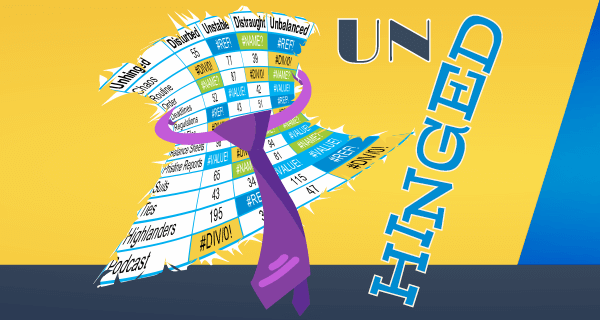Episode 3
Don’t miss out on other podcast episodes from Dean Dorton! Listen and subscribe:
Transcription
Justin Hubbard
Welcome to the Unhinged podcast, where we are loosening our collars to offer real talk about accounting and finance. Today it’s my privilege to welcome our very first guest, Adam Shewmaker.
Adam Shewmaker
How you doing, Justin?
Justin
Welcome to the show, Adam. Doing well. How are you doing?
Adam
I’m doing well. Good to be here.
Justin
Good.
Adam
Happy to be your first Unhinged guest.
Justin
You are quite unhinged, so you were the first person that came to mind.
Adam
Nothing says unhinged like a graying father of six, so happy to play that role for you.
Justin
Yeah, been in quarantine with the six kids.
Adam
Oh, boy.
Justin
So tell us, you’re a director here at Dean Dorton?
Adam
I am.
Justin
Tell us what you do.
Adam
I’m a director in the Louisville office, been with the firm since 2009. I lead our healthcare consulting group, which includes an outsourced physician billing company that we’ve acquired in the last three years, and I oversee the healthcare industry team at the firm.
Justin
Excellent. Have you ever been on a podcast before?
Adam
I’ve listened to numerous podcasts. I don’t think I’ve ever been a guest on a single podcast, so this is the first.
Justin
You know, surprisingly, most people say that.
Adam
I would assume so.
Justin
Yeah. Alright. Since this your first time, why don’t we start with some mental gymnastics?
Adam
Okay.
Justin
I’m going to throw out a word, you say the first thing that comes to mind and don’t worry about being incorrect. Our executive producer, Ms. Carrie, can fix that
Adam
I like it.
Justin
Alright. Okay. Let’s go. Real quick. Politics.
Adam
Trump.
Justin
Shrapnel .
Adam
Metal.
Justin
Snow cone.
Adam
Delicious.
Justin
Powerful.
Adam
Hubbard.
Justin
Touché. Healthcare.
Adam
Complex.
Justin
Ooh, you’re good at that. You just pop them.
Adam
You said rapid fire, so rapid fire.
Justin
So was there some speed dating back in the day or something? Have you practiced that a lot?
Adam
That’s right, yes. MVP of the speed dating scene.
Justin
How did you get into healthcare consulting?
Adam
A great question. On my mother’s side, I had two cousins and uncles who were in hospital administration. So growing up, I was always sort of fascinated when they would talk to me about what they were doing in the healthcare business. I always sort of gravitated towards that and thought that was interesting. When I went to WKU, I majored in healthcare administration, liked it, enjoyed it, and moved to Nashville and started my career.
Justin
Excellent. So let’s dive into healthcare.
Adam
Yeah, my background is pretty heavy in the revenue cycle, whether it be a physician group or a hospital group. The revenue cycle, in its simplest sort of definition, is helping a healthcare organization convert their patient volumes to cash, which seems like… It’s a very simplistic definition of it. But as you can imagine, hospital and physician billing and the healthcare industry is quite complex and sometimes you’re actually amazed that a claim does get paid. There’s so many hurdles to jump through and so many complexities and layers of bureaucracy and regulation that it’s quite complex, but I enjoy the challenge of it.
Justin
So healthcare has been a hot topic, given the COVID-19 crisis. What would you say are some of the biggest misconceptions the public has about the overall healthcare industry?
Adam
I think one of the biggest sources of confusion is always the price or the cost of healthcare. You know, even hospitals and physicians struggle with communicating to a patient, to a consumer, the cost of a service.
On the face, it seems very simple. I’m going to have this service and they should have some idea of what that’s going to cost and many do, but the consumer is still somewhat in the dark as to what something actually costs. If you are going to go to the hospital and have a test, you might get a decent estimate, but more likely than not, that estimate’s not going to be totally accurate based on many factors—your insurance, your coverage, what other services might be performed or ordered for your visit, whether you’ve met your deductible or not. There’s a lot of factors that determine the cost of healthcare.
Justin
Let’s say you’re engaged to do a client project, and then they’re wanting you to come in and dig into the revenue. Let’s say it’s a physician group, 10 providers. When you walk in the door, what’s the first thing you’re looking for? What are your first questions?
Adam
As a patient, I always wonder if they have a good magazine selection in the lobby. I think as a patient, you want to be entertained while you’re waiting. But as an adviser, you want to know that they’ve got their intentions in order, that they want to do better, they want to improve, or else, why are they seeking your advice?
One of the first projects I ever did was this rural physician clinic in Illinois, probably 18 years ago, or maybe the first project I was ever on. We were going to redesign the entire billing office, reshuffle assignments, who did what, how they did it, probably eight or 12-week engagement. But the premise of it was it would increase cash, reduce bad debt, accelerate their cash collections, sort of your normal standard engagement.
We described the entire engagement to the billing office. The CFO got through sort of our pitch on why we were doing it. So then you kind of step back, let everybody digest that. We asked if there were any questions. I remember the lady sitting in the back of the room sort of stood up and said, “I don’t like any of this.” We said, “Well, that’s a comment, not a question. Does anybody have any questions?” I remember that because it was just the shock of how you were going to disrupt their entire office and she was fearful of that change.
The leaders understood it, but the staff level, they knew their world was about to change fairly significantly and it scared them. But the senior leadership bought off and, three months later, we had a successful turnaround.
Justin
Do you find that even folks within an organization, not necessarily in a leadership position or a management position, but the staff like that person in your story, are they often just in the dark or unaware of the overall process within their own entity?
Adam
Yes. Within a department, there are silos. Within a hospital business office, for example, you may have five different departments and they are customer service, payment posting, billing, follow-up. And oftentimes those individuals and those teams don’t know what the other teams in their department are doing or how it impacts them.
The same can be certainly true for like the front-end, the patient access, registration staff, insurance verification. Oftentimes they don’t understand how they’re performing their job or what they may seem to miss impacts the billing staff and it’s eye-opening.
One of the things we always try to do is let people from the front-end shadow a biller for a day or even a half a day, just so that they see here’s someone I registered 30 days ago, I check their insurance, I scan their card. But I didn’t do this right and now here’s the biller having to fix it on the back end. It’s always sort of eye-opening, I think, to the team members to understand here’s my role, but here’s how it’s impacting someone else downstream.
Justin
So do you find that that tears down some of the silos you mentioned?
Adam
It absolutely does. It’s been a little tougher in the last 90 days during COVID because they’ve lost that sense of connectivity and face-to-face interaction, but absolutely that helps when they can see how their work impacts someone else and then they appreciate going to sit with you. They appreciate that person’s position. So now we do it sort of the other way, that we have the biller or the coder go sit with registration, sit with insurance verification and it’s been quite helpful.
Justin
You mentioned earlier that a lot of what you do is focused on cash collections, making sure cash gets in the door, and due to COVID, there’s the impact on the economy, stimulus reporting requirements and so forth. I think cash is a big issue, a big area of concern across all industries. What are some things, or are there things that you would say are common practices or best practices in the healthcare industry related to revenue generation, cash management, or cash collections that would be applicable to a broader group of industries?
Adam
Well, you’re right. In healthcare, cash has always been king and that’s the number one goal of the organization is beyond patient care, obviously, and doing great on the clinical side, to make sure every revenue dollar is fully collected.
During COVID, I’ve spoken with a number of hospital CFOs and executives. The cash focus has not changed, but what they realized going forward now is it’s going to take more than just being effective. Typically, the revenue cycles are effective, but they’ve not always been very efficient. So what took 60, 90 days for a claim to materialize and get paid, get to the patient to collect that balance, it got done. Maybe it wasn’t always the most refined process, but what they’re realizing now is we have to do it more efficiently. We have to be very lean. We have to trim our waste. We have to potentially cut costs and how do we do the same work, the same level of output, but better and quicker now and more accurate.
I think that’s probably something that’s going to impact every industry. I mean, nothing was spared during COVID.
Justin
Absolutely.
Adam
I always thought healthcare would be somewhat recession-proof. People would always get sick and injured and need checkups. But when you shut down the healthcare system, it came to a screeching halt in late March and that revenue just stopped. All elective procedures just came to a screeching halt and it was devastating for community hospitals and physicians.
Justin
Yeah. Do you think the healthcare industry is ready for the catch-up? You have all these procedures that have been delayed, plus things that they would normally have been doing in June and July, had COVID not happened. Is this catch-up going to tax the system?
Adam
It probably will. Most clients I’m talking to now, they are at 80-90% back to normal, which it seems a lot quicker than I would have guessed. Because it came to a halt in April and in May, we’ve seen the last end of May come back. But in June, there’s a lot of clients who are doing quite well right now because of that pent-up demand. So instead of maybe seeing two or three patients an hour, they’re doing four or five. ORs are running longer at night. Surgery centers are opening earlier and standing up later to not just accommodate that natural volume that is there already, but people that have had to cancel and reschedule from March and April and May, they’re trying to fold them in as best they can while taking all the precautions to social distance, while making patients wait in their car, instead of in the lobby, calling them in.
The telehealth has been a great asset. Those who already had a telehealth program were ahead of the curve, big time. The revenue is not as great in some instances, but it does help soften that blow. So those who embraced that in the last year and didn’t have to scramble to do it during COVID-19 was well ahead of the game.
Justin
Got it. You brought up telehealth. In simple terms, what does that mean?
Adam
So the whole premise of telehealth is the ability to connect a patient consumer with a medical provider without having to be a physical face-to-face evaluation.
I was talking to someone this morning on our team who had an appointment with their dermatologist and it took three minutes all via the phone. They waited in their home while working, but the actual appointment took three minutes. So I think telehealth is here to stay because it’s going to be much more efficient. You don’t necessarily have to take off work, drive an hour to your doctor, wait in the lobby for an hour, hope you get in. You end up missing three, four, six hours’ worth of work and it’s very efficient.
Justin
But won’t that kill the magazine subscription business?
Adam
It will crush the magazine subscription. But you can scroll through Twitter while you’re waiting on your couch at home, rather than sitting in a busy waiting room.
Justin
Okay, and that’s breaking news. Sell your stock in magazines subscriptions.
Adam
Urgent.
Justin
We like to focus on best practices, but we kind of take it from an angle of what is a practice that doesn’t make sense, which is common, and what should the best practice be? So in your area, in your realm of expertise, what are some things that you frequently see practice to practice, group to group, and they’re proud of it, but it just makes no sense?
Adam
The thing that stands out to me most in healthcare is still the use of the fax machine. You could walk this earth for 40 days and the only fax machines you would find would be in a physician’s office or behind the front desk at a hospital. They don’t exist. If they do, they’ve not been used in a decade.
But in healthcare you still have faxed orders, you still have data coming in from hospital to physician via fax and it’s amazing that that practice still exists. It has improved with electronic orders and texts and emails certainly, but that’s something that always baffles me is the healthcare industry is still propping up the fax machine industry.
Justin
Wow. Well, maybe telehealth will kill the fax machine industry and the magazine industry.
Adam
I’m not sure that was on your radar when you asked that question, but that’s something that’s still always I get a chuckle out of.
Justin
That is pretty amazing. So apart from getting rid of fax machines, if you could lay down and stamp a law that would apply across all participants in the healthcare industry, what universal change have the effect of a week from today, what would it be?
Adam
Eliminate paper. I say the fax machine sort of jokingly, but it’s also just a symbol of sometimes how archaic the process can be within healthcare. The amount of paper within a physician office in hospitals still pretty high. There are still hospital providers and physicians that are on medical records, paper medical records. Sometimes claims have to be mailed to insurance companies with a paper claim. Almost every time you submit a claim to a workers’ comp insurance company, they want the medical records, which have to be printed and mailed. So I don’t think from an electronic standpoint, healthcare has caught up with most other industries. Certainly they have in many ways, but it goes back to the complexities of healthcare.
The consumer of healthcare is not always the purchaser of the service. So for example, if you go to the ER tonight, you may have zero payment responsibility for that visit. Likely you have some out of pocket, but the payer for your service is your health insurance plan. Multiply you times 100 other patients, each patient may have 100 different health plans and each health plan pays that hospital a different rate. So trying to manage the complexities of that revenue cycle, that’s what causes so many different cash disruptions, employee burnout, the need for external parties to come in and say, “Let’s try a different way to do it.” And the amount of paper and healthcare is always still pretty enlightening.
Justin
Fax machines and paper.
Adam
Maybe Dunder Mifflin sponsors the healthcare industry.
Justin
Good Office reference. Alright. You’re talking about the healthcare industry hasn’t kept up with trends that maybe the rest of the world has adopted.
This question comes out of left field, so feel free to punt, but you got the consumers where all industries are concerned about how do you appeal to various generations of consumers, as well as generations within your workforce. So, are there any trends that are concerning within the healthcare industry as generations change, as the priorities changed, delivery methods change, preferences?
Adam
Well, younger generations do so much with their phone, obviously. They’re constantly connected. They’re constantly engaged with their community, their social media, all of their apps sort of navigating their daily lives. Healthcare is coming to that point. For example, when you go to the airport, oftentimes you will check in via sort of like self-kiosk. That’s been around for a while.
Hospitals have started it, but it’s still something that’s not widely accepted. Let me back up. It’s accepted, but it’s not widely utilized. We have clients who are just now sort of implementing them.
Justin
Got it.
Adam
And they’re a great tool. They’re more efficient. They capture data. It’s interactive. The consumer, the patient can enter their information, confirm it, make a payment, and so it eliminates a lot of that face-to-face paperwork, face-to-face interaction. So I think the younger generation will continue to push some of those electronic capabilities that healthcare has been slow to embrace.
Justin
It’s amazing to me how it is truly a game of monitoring your consumers as I mean, the word patient sounds more pleasant, but in reality, it’s a consumption game.
Adam
It is, yeah. I always think the patient is a patient when they don’t feel well or they’re injured. Whereas if you’re coming in for just sort of a regular visit, you’re a patient, but you’re really more of a consumer. You have the chance to kind of step back and say, “Is this really where I want to go to the doctor? Is this the hospital experience I want for just sort of a normal annual test, perhaps?” If you’re sick and you don’t feel well, some of that judgment is rushed and you’re going to do something that might be a little more urgent, without much thought.
But as a consumer, I always sort of differentiate between, I have time to make a better decision, an informed decision and you can go to three different physicians, let’s say, have the same diagnosis, the same test. So the outcome was the exact same, but that experience could be very, very different. How engaged were they electronically? Did they communicate with you in advance? Did they properly inform you of your test and the sort of the instructions? Did they follow up with you afterwards? So the more you’re engaged with your patient, your consumer base, I think the more successful you are as a healthcare organization.
Justin
Yeah, supply and demand, urgency and deliverability.
Adam
Yeah, and they have to do it all while still trying to generate a profit. Generating a margin in healthcare is very difficult.
Justin
Do you think people don’t realize that healthcare is a for-profit enterprise?
Adam
That’s a good question. I don’t know. When they see their invoice and they see their bill, they’re always shocked at how expensive healthcare costs, so I know they see the cost side of it. We’re working in a hospital now where we’re overseeing their customer service department and the amount of complaints that come in, not because they disagree with the bill, but just because the bill is what it is, that it represents a dollar figure that is five, 10, multiple of what they thought they were getting.
My comments about being able to estimate coverage and cost and being transparent about what something costs, that can be very difficult for a hospital to do. Those who are doing it well, that’s a huge competitive advantage where there are no surprises on the back end because they’ve heard it at scheduling, they heard it at check-in and their statement is very close to their estimate. So that’s goes back to experience. It was a good experience and you’re not shocked on the back end when you get a bill for 10 times what you thought it was going to be.
Justin
Well, that’s probably universal across all industries as well. No one likes hidden fees.
Adam
It’s like when you get your oil change and you think it’s $39.99. Then you walk in and there was another $80 worth of add-ons.
Justin
That only happens to you.
Adam
I didn’t approve any of this. I have a $40 oil change coupon and it costs a hundred bucks. What happened?
Justin
For any of those is expensive, they’re going to catch that up.
Alright, last question. So if you owned a billboard in a major metropolitan area, and let’s say the top 100 executives, it could be healthcare executives, what would you put on that billboard that those executives saw every single day?
Adam
Well, I think after this last 90 days, the first message would be thank you to all the frontline workers, the nursing, the physician groups, therapists, what they’ve been doing during this pandemic is pretty darn amazing. And the volume of issues they’re dealing with at work and then to go home on little rest and come back, that would be the first message is thank you to healthcare community in general because they’ve been stressed pretty significantly in the last three months.
I think the second thing would be continue to invest in business analytics tools, data mining. The healthcare environment is rich with so much data, whether it be clinical, financial, demographics, the sharing of data between your organization and all the insurance plans. There’s a lot of opportunity there to capture data and use it to the patient’s benefit, drive them to the right provider at the right time, detect early stages of various cancers. So some are doing that very well, but the healthcare environment has so much data I think we’re just now scratching the surface there.
Justin
I think you just set us up for episode two of this conversation—
Adam
“Behind the Data, Unhinged.”
Justin
… to be determined.
Adam
I like it. That’s my job is to tee up the next episode.
Justin
Unhinged and lacking data, what we need. Alright. I think we’re out of time. Anything else you want to say?
Adam
I enjoyed it. Thank you for having me, honored to be your first guest.
Justin
As soon as we get a T-shirt, you get the first one.
Adam
Shirt, visor, all the stuff, I want it. Thanks for having me today.
Justin
Alright. Thanks for being on and we’ll do it again soon. We’re out.
Your Host
With Guest








